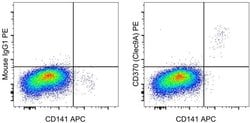Learn More
Invitrogen™ CD370 (Clec9A) Monoclonal Antibody (9A11), PE, eBioscience™
Mouse Monoclonal Antibody
Supplier: Invitrogen™ 12370942

Description
This monoclonal antibody 9A11 reacts with human CD370, also known as C-type lectin family member 9A (Clec9A) and DNGR1. This type II transmembrane glycoprotein is present at the cell surface in the form of a homodimer. CD370 is a cellular receptor expressed by myeloid cells that recognizes F-actin, a dead cell-associated antigen that is exposed in necrotic cells. Upon ligation, CD370 recruits Syk kinase to the ITAM-like motif in its intracellular tail and facilitates endocytosis of antigenic material that is subsequently processed and cross-presented to CD8+ T cells. Human CD370 is expressed by CD141+ (BDCA3+) dendritic cells and, to a lesser degree, by CD14+ CD16- monocytes. Unlike in mice, human plasmacytoid dendritic cells do not express CD370. This 9A11 antibody has been pre-titrated and tested by flow cytometric analysis of normal human peripheral blood cells. This can be used at 5 μL (0.25 μg) per test. A test is defined as the amount (μg) of antibody that will stain a cell sample in a final volume of 100 μL. Cell number should be determined empirically but can range from 10^5 to 10^8 cells/test. Filtration: 0.2 μm post-manufacturing filtered.
C-type lectin domain family 9 member A (CLEC9A) is a gene located on chromosome 12p13.2, encoding a protein that belongs to the C-type lectin receptor family. CLEC9A is primarily expressed on dendritic cells and certain subsets of macrophages, playing a pivotal role in the immune system by recognizing and binding dead cell debris, including necrotic cells. This receptor facilitates the presentation of antigens derived from dead cells to T cells, thus contributing to the initiation of immune responses. CLEC9A is involved in cross-presentation, a process crucial for adaptive immunity, particularly in the context of viral infections and cancer. Its expression and activity are of particular interest for vaccine development and immunotherapy, given its ability to enhance antigen presentation and stimulate robust immune responses. Research into CLEC9A continues to explore its therapeutic potential for modulating immune activity in various diseases, including cancer and infectious diseases.
Specifications
| CD370 (Clec9A) | |
| Monoclonal | |
| 5 μL/Test | |
| PBS with BSA and 0.09% sodium azide | |
| Q6UXN8 | |
| CLEC9A | |
| Affinity chromatography | |
| RUO | |
| 283420 | |
| 4°C, store in dark, DO NOT FREEZE! | |
| Liquid |
| Flow Cytometry | |
| 9A11 | |
| PE | |
| CLEC9A | |
| 9830005G06Rik; CD370; Clec9a; C-type lectin domain family 9 member A; C-type lectin domain family 9, member A; Dendritic cell natural killer lectin group receptor 1; DNGR1; DNGR-1; HEEE9341; RGD1562513; UNQ9341; UNQ9341/PRO34046 | |
| Mouse | |
| 100 Tests | |
| Primary | |
| Human | |
| Antibody | |
| IgG1 κ |
Safety and Handling
The Fisher Scientific Encompass Program offers items which are not part of our distribution portfolio. These products typically do not have pictures or detailed descriptions. However, we are committed to improving your shopping experience. Please use the form below to provide feedback related to the content on this product.
